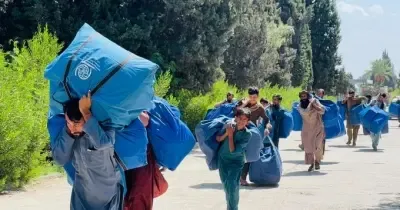Should Pakistan Cease the Deportation of At-Risk Afghan Refugees?

Synopsis
Key Takeaways
- UNHCR calls for the protection of vulnerable Afghan refugees.
- Concerns raised over the safety of women and children.
- Over 2.1 million Afghans face forced repatriation in 2025.
- Pakistan's deportation plan begins on September 1.
- International collaboration is essential for a humane approach.
Kabul, Aug 7 (NationPress) The United Nations High Commissioner for Refugees (UNHCR) has urged Pakistan to stop the deportation of at-risk Afghan refugees, emphasizing that forced repatriation—especially of women, girls, and individuals with health issues—could infringe upon fundamental human rights and protections.
UNHCR has expressed significant apprehension regarding Pakistan's choice to expel Afghan refugees holding temporary residence permits, calling for the safeguarding of at-risk individuals, as reported by Afghan news agency Khaama Press.
In a formal statement, UNHCR implored the Pakistani government to refrain from deporting Afghans in need of international protection, specifically pointing out the dangers faced by women and girls. It cautioned that compulsory repatriation might expose these groups to grave violations of their basic rights under Taliban governance.
The UN refugee agency urged Pakistan to exempt students and those with health conditions from deportation, recognizing their vulnerability and the necessity for ongoing support.
While UNHCR acknowledged Pakistan's decision to delay deportations for one month, it stressed the importance of using this time to evaluate individual cases and adhere to humanitarian principles.
According to the UN, over 2.1 million Afghans have returned or been compelled to return to Afghanistan in 2025, with at least 352,000 having been deported from Pakistan.
This statement from UNHCR follows the announcement by Pakistan's Ministry of Interior that the repatriation of Afghan nationals holding Proof of Registration (PoR) cards who do not choose to return voluntarily will commence on September 1.
The notification from Pakistan's Ministry of Interior indicated that the voluntary repatriation process for PoR cardholders will begin immediately, while compulsory repatriation for remaining Afghan individuals will start on September 1, according to Pakistan-based The Express Tribune.
This decision was made during a high-level meeting that considered escalating security concerns and the strain on national resources. The Ministry noted that the ongoing repatriation process for holders of Afghan Citizen Cards will proceed as per the earlier decisions established by the Interim Framework for the Return Process (IFRP).
The Ministry of Interior plans to work with international agencies, including the Taliban-led interim government and UNHCR, to facilitate the repatriation of Afghan refugees.










